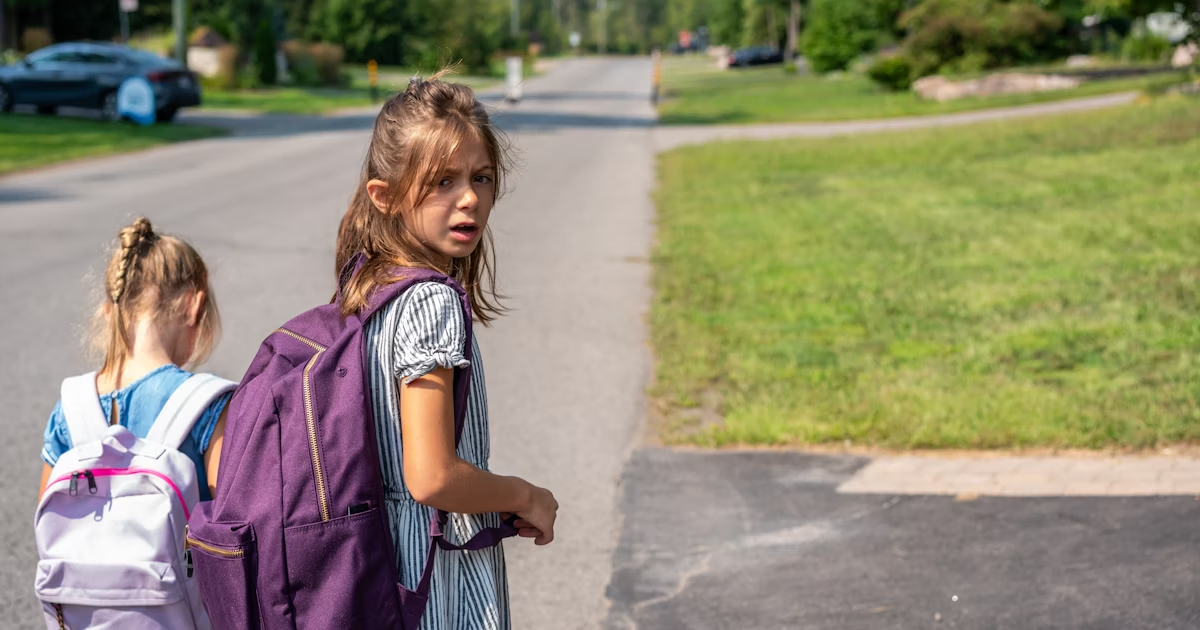I have neurodivergent children. I’m no stranger to meltdowns. I’ve been dealing with these intense emotional reactions in my daughters for years, and I’ve been trying to understand their triggers so that I can take action before a meltdown occurs. But I can only control so much. My daughter’s daily meltdown after school is killing me.
My two daughters are 5 (kindergarten) and almost 8 (1st grade) and their meltdowns usually begin the moment they are released from the care of school and returned to me. This is no exaggeration. We walked to and from school, and after school, the teacher led all the “walkers” to a spot on the sidewalk and told them to run to their parents. While most students happily hug adults, my girls will usually fight over little things (and about a 50% chance of crying too) if it actually happens to them On the shoulders, they will roll off the shoulders. This set the tone for our walk home.
We live close to school, but my girls seem to have a complete meltdown within the five to ten minutes it takes to get from school to our house. They complain because it’s too hot, or they yell because they both want to tell me about their day at the same time, or they get angry because I won’t let them play against each other. (I made the mistake of letting them race a few times – the results never turned out well.) There are no predicted crash triggers on the way home because basically, anything can be a trigger.
Most of the time, my nerves are already on edge when we walk into the house, but I have no choice but to muster the patience and energy to help them regulate. I knew if I lost to them it would just make for a harder night for us. I know this because I’m not perfect and I’ve definitely lost them on more than one occasion.
I know that after-school meltdowns are common for many kids. For about six hours a day, students are expected to follow the rules, get along with their friends, and follow their instructions; otherwise, they get into trouble. Complying with these expectations can be difficult any kids, but for neurodiverse kids, this can be especially challenging because of the way their brains are wired. In many cases, they need to expend more mental energy to meet school expectations because it does not come naturally to them.
For example, my youngest, who is in kindergarten and is diagnosed with autism, spends her school day not only doing the work that everyone else does, but she also works very hard to recognize and follow unspoken social norms and do the best she can. She tried her best to hide her frustration inside whenever something unexpected happened to her. My oldest is a second grader with anxiety and suspected ADHD, and even when her body wants to move, she will allow herself to sit quietly and do her best to ignore external distractions and internal dialogue so that she Able to concentrate in class. This is called masking, and it’s very energy-consuming. So it’s no wonder my kids have meltdowns after school because they’re exhausted and they know home is a place where they don’t need to wear a mask.
Still, while I understand why they feel down every day, as a parent, these reactions can feel overwhelming. I don’t like being used as an emotional punching bag. Yes, I have compassion and empathy for my girls—I also have ADHD and know how tiring it is to wear a mask all day—but I’m still human. By the time school let out, I’d put in about six hours of work, was tired and out of tune, and now dreaded picking up because I knew what was most likely to happen ahead.
I know the positive here is that my kids feel safe with me, otherwise they would continue to wear masks. I Know I try to remind myself of this regularly. But it’s hard to remember when your 5-year-old plops down in the middle of the sidewalk crying while your 7-year-old yells at her to get up because she’s “hungry” and needs a snack, versus Meanwhile your neighbors walk by with their kids and they make it all the way home before they collapse.
If there is a workaround here, I haven’t found it yet. So, my only option is to keep showing up, take a deep breath, and hope we all get home without too much lasting emotional damage.
Ashley Ziegler is a freelance writer who lives outside of Raleigh, North Carolina, with her two young daughters and husband. She has written on a range of topics throughout her career, but particularly enjoys covering all things pregnancy, parenting, lifestyle, advocacy and maternal health.




